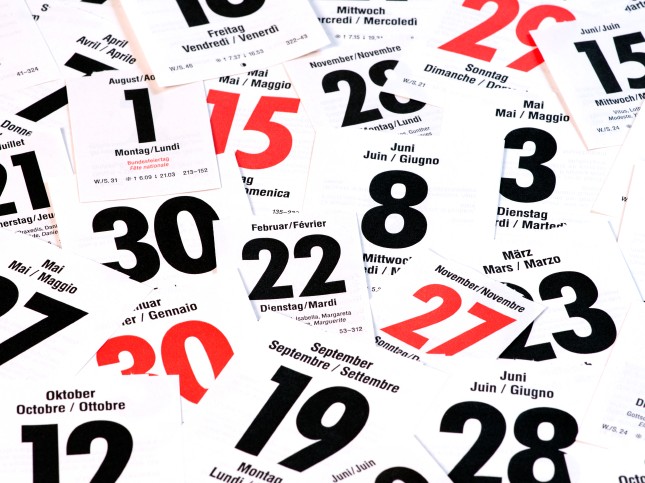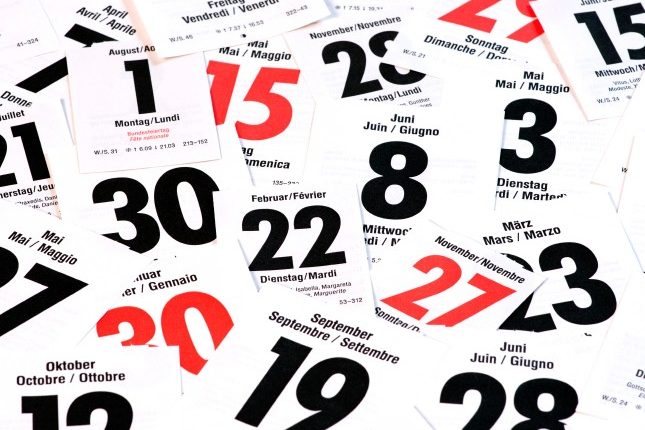Although we are all familiar with the Rosh HaShanah, the “Head of the Year,” which occurs in the Fall, there are actually four Rosh HaShanah’s which define, to an extent, the Hebrew calendar. They are as follows:
1. First of Nisan – This is the month about which Moshe was commanded in Egypt, “This month shall be considered by you as the First of the Months; it is the First for you of the months of the year.” Historically, this was the month of the Exodus from Egypt, the beginning of Jewish national history.
 It is considered the “first” for the purpose of counting the Festivals of the Hebrew Calendar, and reckoning of the years of reign of the Kings of Israel. Thus, the Festival occurring in Nisan, Passover, is considered the First Festival. With regard to the reign of kings, if a particular king began his reign in the month before Nisan, then in Nisan, he is considered to be in the second year of his reign.
It is considered the “first” for the purpose of counting the Festivals of the Hebrew Calendar, and reckoning of the years of reign of the Kings of Israel. Thus, the Festival occurring in Nisan, Passover, is considered the First Festival. With regard to the reign of kings, if a particular king began his reign in the month before Nisan, then in Nisan, he is considered to be in the second year of his reign.
2. First of Elul – Elul is considered the “first” of the months regarding the practice of “Maasrot,” or tithing (the prescribed donations of one tenth of various totals) found in the Torah; this one, in particular, referring to cattle. The law is that cattle born before the first of Elul, are considered separately from cattle born after the first of Elul, and the “tenth” for each year is determined on the basis of that year’s group alone. Since this “tenth” of animals had the status of sacrifices in the Temple, in our time, since the Temple has not yet been rebuilt, this law has no practical application. Once the Temple is rebuilt in Yerushalayim, this Rosh HaShanah will regain its significance.
3. First of Tishrei – This is the Rosh HaShanah of the Fall, the one we are most familiar with. The reason we are most familiar with it is that it is on this day that Divine Justice is meted out to all individuals and to all nations. It is the date on which the cases of all of G-d’s creatures come up before the Heavenly Court for a ten-day “trial” beginning on Rosh HaShanah, which is the first day of the Ten Days of Repentance, and climaxing on the Tenth of Tishrei with the Day of Atonement, Yom Kippur, when the fate of each one is sealed.
This date also serves in determining the beginnings of two other innovations of the Hebrew Calendar: the Shemitah (Sabbatical) Year and the Yovel (Jubilee) Year.
4. The 15th of Shevat (Tu b’Shevat)
A Weekday Rosh HaShana
Although the 15th of Shevat is called Rosh HaShanah, the designation applies only to the matter of tithes that are due from fruit of the trees. Work is not prohibited, and there are no required festive meals, and no special prayers added to the regular prayer services. Nevertheless, the day is invested with a festive sense. Tachanun is not said. Eulogies are not delivered for the dead, and if it falls on Shabbat, Av Harachamim is not said (since Av Harachamim recalls the souls of the dead.) It is customary to eat a new fruit from the Land of Israel of which one had not yet partaken the present year, so that the “bracha” or “blessing” of SheHecheyanu may be said.
The reason for the festive mood of the Rosh Hashanah of trees is that the 15th of Shevat recalls the praise of the Land of Israel, for on this day the strength of the soil of the land is renewed. With reference to the fruits of the trees and the produce of the soil, the Torah praises the Land of Israel: “A land of wheat and barley and vines and fig trees and pomegranates, a land of olive trees and honey” (Devarim 8).
Another reason for the special observance of the 15th of Shevat is that the time of Rosh Hashanah for the trees is also a time of prayer and judgment concerning the trees. Whenever any of His creatures begins to grow, G-d surveys its entire future. So it is proper, at such a time, to pray that the new creature or being might prosper.
The Torah has compared Man to a tree of the field; hence this day also recalls the Divine judgment upon man. For such is the character of the people of Israel, that they rejoice on a day of judgment. Whatever the decision is, let all see that “there is a law and that there is a Judge.” The Torah is the law, and G-d is the Judge.

